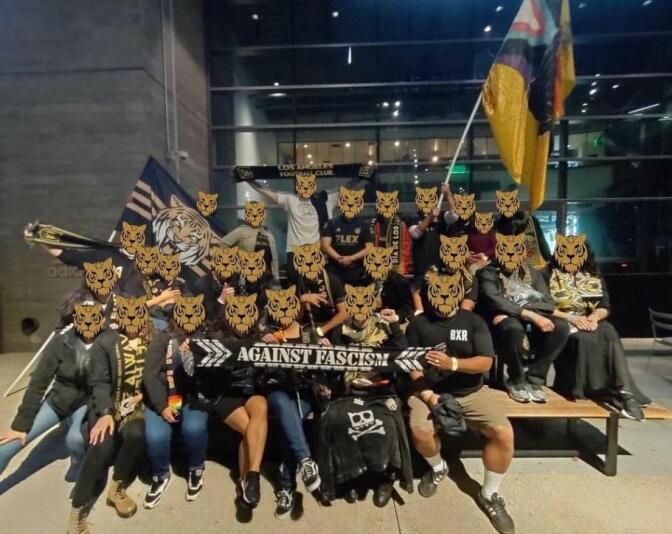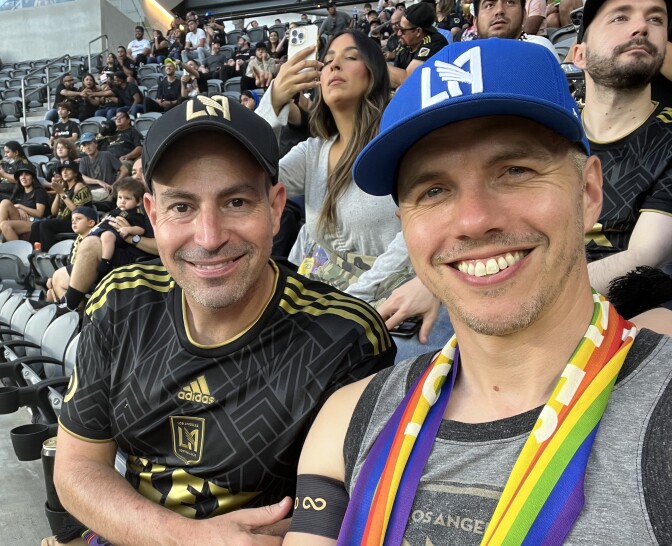This story is free to read because readers choose to support LAist. If you find value in independent local reporting, make a donation to power our newsroom today.
How LAFC Fans Helped Make The Stadium A Welcoming Space For All

Long before setting foot in the Banc of California stadium in Expo Park, you can hear the Los Angeles Football Club (LAFC) fans.
In the north end of the stadium in South L.A., they spend the entire game on their feet: Chanting. Stomping. Jumping. Cheering.
There are 3,252 seats in this section — and come this Sunday, for LAFC’s last Major League Soccer match of the season, it’s expected to be packed.
Fans say even though these are some of the cheapest seats in the house, this is where the good stuff happens.
Fan Clubs With The Power To Transform Game Days
Most of the people here are in fan clubs, which they call “supporters groups.” And over the years, they’ve worked hard to make the stadium a welcoming space for everyone.
Daisy Chavez is part of Lxs Tigres del NorthEnd, a supporters group made up of Angelenos from all walks of life, including teachers, immigrant rights advocates and day laborers.
They named their group after Los Tigres del Norte, the legendary Mexican norteño band. But they spell “los” with an X instead of an O.
Chavez said they do this because they believe visibility matters.
“We want to make sure that we uplift every single person that is nonbinary, that is part of the LGBTQ community, that is female and often left out,” she said.
At the stadium, you might see Lxs Tigres del NorthEnd members drumming or waving huge transgender pride and rainbow flags.
The stadium wasn’t always this welcoming. At LAFC's home opener in 2018, Chavez said, some fans were shouting an anti-gay slur during the opposing team’s goal kicks, a custom with a long history in Mexican soccer games.
“When the games first started in 2018, we heard the chants that we hear in Latin America, we heard the chants that are oppressive, that are homophobic,” she said.
It took organizing to put an end to it — and Chavez said supporters groups played a key role. Members actively asked sports fans standing near them at the games to stop using discriminatory language. Over time, things shifted.
“You don't hear them anymore,” she said. “And that was all community-led.”

“That's why we fly our trans flag. That's why we fly our queer flag,” Chavez added. “We know that there are still some challenges that need to be addressed, and we are not waiting for anyone to do that for us.”
Luke Klipp is part of Pride Republic, a supporters group for LGBTQ+ fans and allies.
He was at the LAFC’s first home game at Expo Park back in 2018. And like Chavez, he heard the slurs, an experience he described as “off-putting.”
The team reached out to supporters groups for advice on how to respond, Klipp said. And at the next home game, the team captain, along with the heads of Pride Republic and other supporters groups, denounced the homophobic chant.
One by one, he added, they came out and said: “We are not going to allow this to continue. This is not part of who we are.”
During that game, the team put out rainbow flags on the field, alongside its signature black and gold. For Klipp, it all made it “clear that this is a welcoming and supportive community.”
Since then, he and his husband have become LAFC season-ticket holders. And when friends come in from out of town, they always invite them to “the Banc.”
“It was originally just kind of, ‘Oh, this will be fun. Let's do this,’” Klipp said. “Now I have a couple dozen scarves, several hats — half my wardrobe is black and gold. It's sort of taken over my life, but I love it.”
Before the pandemic, he added, Pride Republic helped organize LAFC participation in West Hollywood’s Pride Parade. He still recalls the euphoria of marching down Santa Monica Boulevard with his fellow soccer fans, chanting the club’s call to arms.
Now, when Klipp hears it at the stadium, he’s reminded of that day in West Hollywood.

“More Than Football”
Sujin Lee is the vice president of The 3252, a collective that represents several LAFC supporters groups. Guidelines posted on their website stand firmly against the goal kick chant. They also underscore that “inappropriate touching or unwanted advances, discrimination, prejudice, or harassment” will not be tolerated at the stadium, and they provide information on where to turn to for help.
But if LAFC supporter culture is about fostering respect, it’s also about building community, Lee said.
Her relationship with LAFC began with Tigers, a supporters group she co-founded with friends in Koreatown. For Lee, LAFC games are a great way to meet Angelenos you wouldn’t normally encounter.
Of all the official club chants, she said, her favorite chant is “Somos del barrio angelino” (“We’re from the Angeleno neighborhood”), because it's in Spanish.
“If you come into [the north end of the stadium], it's not just Latinos,” Lee said. “It's a mix of all the cultures around L.A. So when you hear that chant, and you see people who you don't think would know Spanish singing that song, it's a beautiful moment.”
“We've built an amazing community,” she added. “It's definitely more than football.”
Honoring A Lost Brother
If you go to an LAFC game and make your way to the north end (tickets are still available for Sunday’s game and start at about $100), you might see someone smile and mention “Mo.”
If you do, they’re probably missing Mauricio Fascio. At the height of the pandemic, COVID-19 took the life of one of the LAFC’s biggest fans.
At the time of his death, Fascio was vice president of The 3252, known to break up fights and speak up against homophobia, misogyny and racism at the stadium. He was a tall, gregarious man, always ready to welcome newcomers.
“If you ever had the opportunity to meet him, man, he just transformed you. He was so positive, incredibly progressive and open minded, just an amazing brother, ” Chavez said.

Fascio was with the LAFC from the start.
At first, said his wife, Anna Rivera, “I didn't understand what all the fuss was about. He would go by himself, then come back and tell me about everything.”
“He was quick to buy season tickets,” she added.
Fascio joined a supporters group called the District 9 Ultras and coaxed her into accompanying him.
“And so, we started being part of the contingent that would get there early to help set up. We were there at eight, nine o'clock in the morning, grabbing our spot with the other supporters groups,” Rivera said. “I met those folks that also showed up at those crazy times and got to hear about what brought them to LAFC. And I made friends that way.”
When her husband passed away, LAFC fans reached out to Rivera, asking if they could help with the funeral expenses.
“Everybody wanted to do something, to show that they cared about him,” she said. Instead, Rivera suggested building a memorial in his honor.
Now LAFC supporter groups are raising money to build an indoor soccer court named after Mo. Because Fascio grew up in Huntington Park, it will be built in Southeast L.A.
“It was just an automatic given that we would do whatever we could to help make this a reality,” said Klipp of Pride Republic. “Because the man he was, the life he lived, the people he brought together, will be embodied by this court, which is going to provide the opportunity for so many new folks to get together to be able to experience the beautiful game.”
For Chavez and the rest of Lxs Tigres del NorthEnd, the memorial is an important way to honor Fascio’s memory, but so are everyday acts that “challenge homophobia, sexism, and racism.”
“Every time that we do that,” she said, “he lives through us.”








